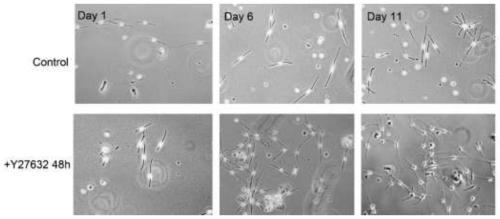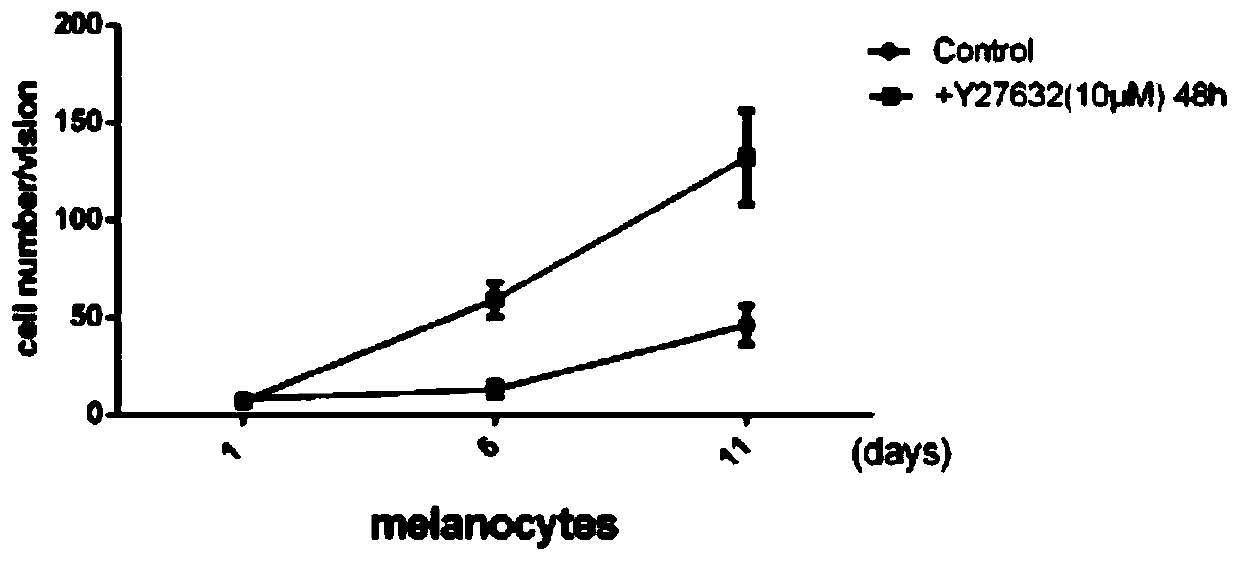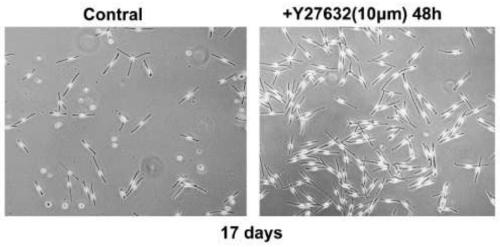A method for efficiently isolating and culturing human primary melanocytes
A high-efficiency technology for melanocytes, applied in the field of high-efficiency separation and culture of human primary melanocytes, can solve the problems of long culture period and slow cell growth, achieve shortened culture period, simple separation and culture methods, and realize large-scale production Effect
- Summary
- Abstract
- Description
- Claims
- Application Information
AI Technical Summary
Problems solved by technology
Method used
Image
Examples
Embodiment 1
[0035] Example 1 A method for efficiently isolating and culturing human primary melanocytes
[0036] Described method comprises the following steps:
[0037] (1) Remove the subcutaneous tissue of the fresh skin tissue, cut it into small pieces and put it into a petri dish containing 2.5mg / ml dispase solution for overnight cultivation at 4°C;
[0038] (2) The epidermis is peeled off from the skin tissue after step (1) culture, and the melanocytes are separated. The specific steps are: cut the peeled epidermis into a homogenate sample with a scalpel, and then use 10ml of 0.05% trypsin Digest at 37°C for 15-30 minutes; add 10ml of DMEM medium containing 10% serum and pipette repeatedly more than 20 times to obtain a single-cell suspension, filter it with a 100-micron filter and centrifuge at 1000 rpm for 5 minutes, discard the upper culture medium, and then Repeat the process once to obtain melanocytes;
[0039] (3) Inoculate the melanocytes obtained in step (2) into a culture ...
Embodiment 2
[0041] Example 2 A method for efficiently isolating and culturing human primary melanocytes
[0042] Described method comprises the following steps:
[0043] (1) Remove the subcutaneous tissue of the fresh skin tissue, cut it into small pieces and put it into a petri dish containing 2.5mg / ml dispase solution for overnight cultivation at 4°C;
[0044](2) The epidermis is peeled off from the skin tissue after step (1) culture, and the melanocytes are separated. The specific steps are: cut the peeled epidermis into a homogenate sample with a scalpel, and then use 10ml of 0.05% trypsin Digest at 37°C for 15-30 minutes; add 10ml of DMEM medium containing 10% serum and pipette repeatedly more than 20 times to obtain a single-cell suspension, filter it with a 100-micron filter and centrifuge at 1000 rpm for 5 minutes, discard the upper culture medium, and then Repeat the process once to obtain melanocytes;
[0045] (3) Inoculate the melanocytes isolated in step (2) in a medium cont...
Embodiment 3
[0047] Example 3 A method for efficiently isolating and culturing human primary melanocytes
[0048] Described method comprises the following steps:
[0049] (1) Remove the subcutaneous tissue of the fresh skin tissue, cut it into small pieces and put it into a petri dish containing 2.5mg / ml dispase solution for overnight cultivation at 4°C;
[0050] (2) The epidermis is peeled off from the skin tissue after step (1) culture, and the melanocytes are separated. The specific steps are: cut the peeled epidermis into a homogenate sample with a scalpel, and then use 10ml of 0.05% trypsin Digest at 37°C for 15-30 minutes; add 10ml of DMEM medium containing 10% serum and pipette repeatedly more than 20 times to obtain a single-cell suspension, filter it with a 100-micron filter and centrifuge at 1000 rpm for 5 minutes, discard the upper culture medium, and then Repeat the process once to obtain melanocytes;
[0051] (3) Inoculate the melanocytes obtained in step (2) in a medium con...
PUM
 Login to View More
Login to View More Abstract
Description
Claims
Application Information
 Login to View More
Login to View More - R&D
- Intellectual Property
- Life Sciences
- Materials
- Tech Scout
- Unparalleled Data Quality
- Higher Quality Content
- 60% Fewer Hallucinations
Browse by: Latest US Patents, China's latest patents, Technical Efficacy Thesaurus, Application Domain, Technology Topic, Popular Technical Reports.
© 2025 PatSnap. All rights reserved.Legal|Privacy policy|Modern Slavery Act Transparency Statement|Sitemap|About US| Contact US: help@patsnap.com



